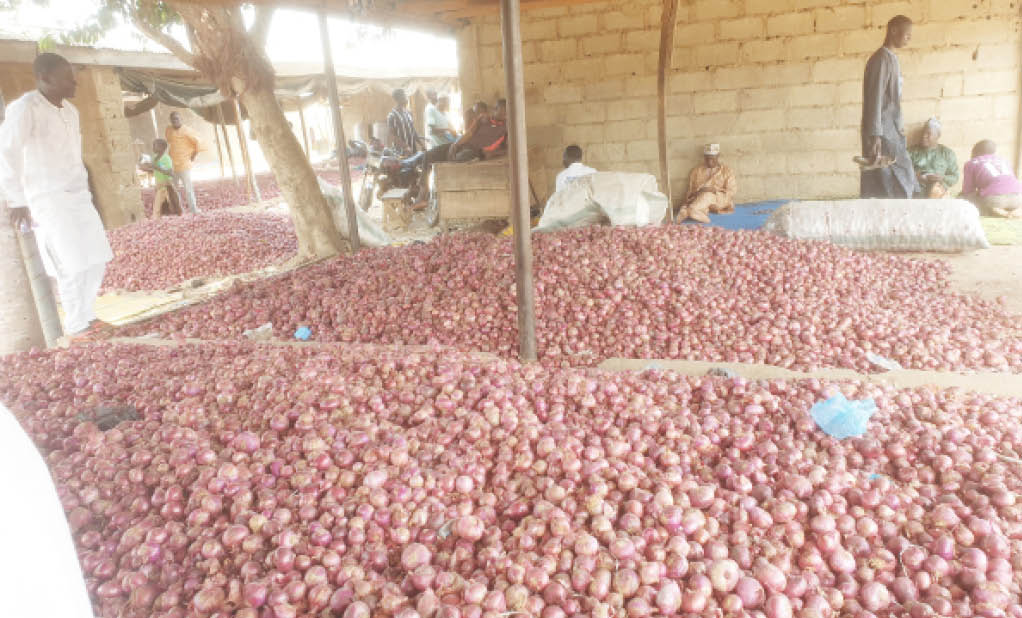Karfi onion market, located in Karfi town in Kura Local Government Area of Kano State, is said to be one of the biggest markets supplying onions to the southern part of the country and neighbouring states.
The market also serves as a place where people in Kano and neighbouring states purchase onions, either for marketing or consumption.
Scientists shifting cowpea farming focus to Benue women
AGRO SOLUTIONS: Do you know how healthy your ‘soil skin’ is?
The market, which has been existing for over four decades, remains a hub for onion farmers, particularly the southern part of Kano, where onions are farmed in bulk. From the market, onions are processed, bagged and transported to buyers.
From the movement of onions from farms to the market, hundreds of people, including men and women, children and youth, find a means of living from the series of processes it undergoes, thereby providing employment opportunities from various segments.
Some of those who enjoy the opportunities are dealers who often supply to other parts of the country, whole sellers and retailers.
Others surviving through the market include transporters, porters and young girls who earn a living through the remains of the stores and farms, as well as those hawking by the roadside.
Speaking to Daily Trust on Sunday, one of the dealers in the market, Sulaiman Idris, 38, said he had been in the business for almost two decades now. He started as a porter in the market and later rose to become a dealer, supplying onions to almost all the parts of the country.
He said he joined the market with zero capital but now has over N2 million as capital, adding that people also give him their money from other sides to purchase onions for them, which adds to his capital.
“I remember the time I came here for the first time just to get some little change for myself. But look at where we are now. I returned from the South yesterday. I went there to deliver onions to dealers there. I just supplied one trailer now, but when it is the season, I can supply up to 10 trucks.
“As you know, the market is dominated by indigenes of this place because we all grew to see it in our surrounding. Ninety per cent of our population survives through the market. This is not the season of onions, but every day we send over 5,000 sacks to the South. Also, our customers from the city and other places come to buy in large quantities,” he said.
He said that during the season they would load 30 to 50 trailers in a day, aside small trucks, J5 and other vehicles that carry onions to different places.
Mallam Umar Manya, a farmer who switched to onion selling in the market, told our correspondent that the consistency of the market and daily demand of onions forced him to drop farming activities and venture into the business on a fulltime basis.
According to him, with the business he can now feed his family, relatives and sponsor his children to school.
“I was a fulltime farmer, but I now do it on a part time basis because of the business of onions. This market has replaced my farm for over 10 years now. That is where I am surviving. I left the farm for my children to also learn the process,” he said.
Manya also said he sold 10 to 20 bags of onions every day during the season, adding that the commodity is not yet much in the market; hence he sells two to five sacks every day. He also said the business depended on his customers’ demand as he could sell up to 100 sacks if the demand is high.
The traders further explained the reason the prices of onions go high in some periods and what can be done to control the situation.
One of the leaders of the market, Jibrin Iliyasa, said storage facilities that are not available for them had led to losses, especially from the producers’ side. He said whenever it was the season for onions they would sell at a cheaper price to avoid loss as it could rotten.
“If we had modern storage facilities we could store up to a year and the price can be controlled. But if we have to sell all that was farmed in a season, then it will be scarce during a period like this and the price must go high. Even now, it is high because we don’t have it here; we have to travel to places like Gombe and others to get it. The new variety is sold at N38,000 while the old is N43,000 per bag,” he said.
He said the market usually boomed from January to August and onions are always supplied during the period non-stop because that’s the peak period of its harvest.
Those who engage in menial jobs in the market also told Daily Trust on Sunday that the business has been a means of survival for them, adding that they are hopeful of become dealers in future.
“I can generate up to N5,000 in a day whenever the market is booming. But in situations like this, I can get N1,000 or sometimes N2,000; and I thank God for that. I believe that one day I will become one of those selling onions here because I am always learning the process,” a porter, Habibu Lawan said.

 Join Daily Trust WhatsApp Community For Quick Access To News and Happenings Around You.
Join Daily Trust WhatsApp Community For Quick Access To News and Happenings Around You.


